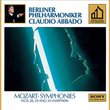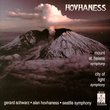| All Artists: Rainer Trost tenor, David Zinman conductor, Tonhalle Orchestra & Chorus, Fritz Naf chorusmaster Title: Beethoven: Missa Solemnis Members Wishing: 0 Total Copies: 0 Label: Arte Nova Classics Original Release Date: 1/1/2005 Re-Release Date: 10/11/2005 Genre: Classical Styles: Opera & Classical Vocal, Historical Periods, Classical (c.1770-1830), Symphonies Number of Discs: 2 SwapaCD Credits: 2 UPC: 723721175658 |
Search - Rainer Trost tenor, David Zinman conductor, Tonhalle Orchestra & Chorus :: Beethoven: Missa Solemnis
 | Rainer Trost tenor, David Zinman conductor, Tonhalle Orchestra & Chorus Beethoven: Missa Solemnis Genre: Classical
"Revelatory?chorus and orchestra are astonishing: both of them very fine bodies and? here? responding to Zinman?s idea of the music as though for joy and with the assurance of true virtuosos?exhilarating and quite profound... more » |
Larger Image |
CD DetailsSynopsis
Album Description "Revelatory?chorus and orchestra are astonishing: both of them very fine bodies and? here? responding to Zinman?s idea of the music as though for joy and with the assurance of true virtuosos?exhilarating and quite profoundly moving?" ? Gramophone Beethoven?s greatest choral work in a sublime performance under the direction of David Zinman, universally regarded as one of today?s finest Beethoven conductors. The Missa Solemnis was first performed in 1824 and Beethoven himself proclaimed it his greatest work to date. The Swiss Chamber Choir (Schweizer Kammerchor) was founded in 1997 under the direction of Fritz Näf, who has made 15 CDs and recordings for radio and television. The four soloists are all well-known as opera and oratorio singers in Europe. Born in 1936, American conductor David Zinman has risen to the pinnacle of his career in the last decade. His discography of some 100 recordings has won five Grammys and two Grands Prix du Disque. Founded in 1868, the Zurich Tonhalle Orchestra is Switzerland?s oldest symphony orchestra. Similarly Requested CDs
|
CD ReviewsZinman & Tonhalle: A Beethoven Joy For All Seasons Dan Fee | Berkeley, CA USA | 11/30/2005 (5 out of 5 stars) "The large - and in all senses of the word, imposing - great mass by Beethoven has not become associated with a particular season, religious or secular. Yet. Handel's Messiah, Menotti's Amahl and the Night Visitors, Tchaikovsky's Nutcracker, Britten's Ceremony of Carols - these and other works are firmly anchored in our December senses. Even beyond Christmas as such, many cultures have some sort of prominent winter festival. One begins to reflect on festivals the moment the first notes of this performance of the Beethoven Great Mass break forth from the speakers. Festivals and music-making are inseparable all around the planet. Now Zinman and Tonhalle have already long since presented their Beethoven credentials on red book standard CD at the world's doorsteps, having offered us the astounding cycle of the nine symphony recordings (also released on Arte Nova, inexpensively). That series of recordings justly deserved winning the German record critics' prize for 1999. But even very fine players who can do the symphonies can still fall short in this Everest of the composed masses available to us in the west. So how do these wonderful folks do in the Missa Solemnis? All their familiar Beethoven gifts are in evidence. Though not playing on original instruments as such; their phrasing, rhythms, and tempos owe much to the vigorous performance practices that had arisen among original instrument or period instrument musicians, say, by about the third or fourth generation of ongoing research & recreation. To this sort of player, even very great and long-revered music is not the least bit sleepy. Think Vivaldi's Four Seasons by the likes of - Il Giardino Armonico, or Fabio Biondi & Europa galante, or Rinaldo Alessandrini & Concerto Itialiano. That is, this is not your great-great grandmother's 19th century performance practice. None of this vigor means much, however, unless it serves musical and expressive ends. Happily, Zinman and company have very pointed musical ends in mind as they play this Beethoven Great Mass. If you have felt past and more traditional performances of this work have fallen into lumbering along, despite their often stellar casts; this may be just the pick me up that you have been looking for in this work. There is a lightness, a deft touch - a spirit of bel canto song, if you will - that informs the faster passages in the Zinman and company approach. Theirs is not blizzard speed for its own sake; nor slowing for the sake of formed seriousness lacking depth of intention. Fast or slow or in between, the point is the shape of the music Zinman and company have let find them and hold them fast. Odd as it may seem given the sheer outsized proportions of the Great Mass as the composer consciously intended it, the fugues in this performance lean more towards dance than towards academic schools of polyphony or mathematics. Did you realize fugues were a happy fizzy champagne? Just listen to Zinman and company do the fugues here. The high and musical unity of purpose holds for the orchestra, the chorus, and the four soloists under Zinman's direction. Whether as an effect of inspired leadership or of diligently led preparation, every singer or player in this performance is working together, a Gloria dei, and probably a Gloria Beethoven as well. As you listen, you may find that the deeper consistency on display to the ear does not preclude many thought provoking and happy touches, both immediately in passing in a particularly inflected phrase, and in the larger paragraphs and pages, too. Just as the orchestra needs to be one and many at the same time, so the four soloists have their separate and common tasks to challenge them in this music. Rainer Trost rings out from his very first entry in the Kyrie; and all the others meet him as equal artists throughout. The ladies are both very fine, with Luba Organasova and Anna Larson in exquisite voice, singly and together. The bass is Franz-Joseph Selig, and as the bottom of the quartet's sung music he is a solid foundation, musical - way more than the gruff bear out of winter hibernation that growls away at the bottom of the staves. If the ladies blend well, so do the gentlemen singers. And the quartet becomes that mystical one in four angels that floats on the heights of this Everest of a composed mass. Somehow all this reminds me of Mahler's anchorites chorus in the second half of his eighth symphony setting of the finale of Goethe's Faust. There is hardly any real weakness here, then, on anybody's part. The Tonhalle band relishes Beethoven, just as successfully - and with equal good humor - as in their symphony cycle. Zinman presides, the first among equals. And the chorus is all vocal zest and tang, as if Beethoven's quasi-instrumental vocal writing were more like a conversation among friends having a stroll on a fine day with no worries in sight. Don't fall into the trap of believing that the Beethoven Great Mass is really easy music, just because these performers make it sound so superbly effortless. There is hard work behind the scenes here, as well as the genius and joy that resound in the listener's ears. Except for the listener who might fell weak in the knees to own such gold, so cheaply as Arte Nova allows. Don't mistake this budget recording for any other, budget or mid-price or full. It is its own reason for being, a Gloria Beethoven. Now stop reading and click yes on your little shopping cart icon. You will certainly not at all ever be sorry that you got this CD, and you will most likely end up letting it share the shelf with other great recordings of the past. This is easily the equal - maybe the better in a certain sort of sense - of the closest neighbor, the John Eliot Gardiner recording at full price. Kudos and stars all round. Now buy this CD, if you please." A Radiant Missa Solemnis Robin Friedman | Washington, D.C. United States | 01/29/2007 (5 out of 5 stars) "Addendum to the following review: March 10, 2007. It is obvious that many lovers of Beethoven's Missa Solemnis disagree with the review below. On reading the criticisms of Zinman by my fellow reviewers, I have decided to let the review stand. The critics have a point. Zinman's reading of the work is fast, fluid, and graceful. Some equate this with a lack of reverence. But I think it more a matter of hearing a transcendental work in a new way. Zinman's is not the only way to perform the Missa but it offers its own light on a limitless score. There is something to be learned from and savored in it even though it may not be everyone's Missa. Classics Today rated this performance highly, noting that it was particularly good for new listeners who might otherwise have inordinate trouble with this famously difficult music. I wrote my review for people coming anew to this difficult work and for people whose ears were open to new approaches. It is not the only way of hearing Beethoven. Robin Friedman Beethoven completed his Missa Solemnis in 1823, following four years of effort. With the possible exception of "Fidelio", no other work cost Beethoven such pain. With some reason, Beethoven regarded the Missa Solemnis as his greatest composition. With its size, complexity, and varied use of musical forms, the Missa Solemnis may be Beethoven's most difficult work to approach. But the meaning of the work is clear: the Missa Solemnis constitutes Beethoven's sustained effort to come to terms with God and with his own life. Through its frequently tortured moments, the Missa Solemnis ends with a deeply moving prayer for inner and outer peace. This Missa Solemnis by David Zinman conducting the Tonhalle Orchestra Zurich is a joy in the exuberance it brings to the work. Zinman served as Conductor of the Baltimore Symphony Orchestra from 1985 -- 1998 and as Chief Conductor of the Tonhalle Orchestra since 1995. In 1999 Zinman and the Tonhalle Orchestra recorded a widely-acclaimed cycle of the Beethoven symphonies. This recording of the Missa Solemnis dates from 2001, has only recently been rereleased on Arte Nova, and meets the same high standard. The CD is available at a budget price. Joy, transparency, and lightness characterize Zinman's reading of the Missa Solemnis. Zinman's interpretation compliments that of many other recordings which emphasize the solemn and severe aspects of the music. A key to Zinman's approach lies in tempo. His performance of the Missa runs just under 66 minutes. In contrast, an excellent budget performance on Naxos by the late Kenneth Schermerhorn's runs over 77 minutes while Otto Klemperer's magisterial reading of the Missa Solemnis is close to 80 minutes in length. Zinman's pacing of the work gives it a joyful, moving flow, even in the complex fugal sections. It reminded me that religious search is serious but not necessarily ponderous. Zinman's reading is filled with hope. In addition, there is a wonderful unity of effort in this CD among the orchestra, chorus, and soloists. They tend to blend beautifully together as the four solo voices interlace with the chorus and with each other. Beethoven composed the Missa Solemnis in five large blocked sections, Kyrie, Gloria, Credo, Sanctus, and Agnus Dei. Each of the sections is a unity but yet each also consists of widely different types of music. Beethoven used a great deal of archaic material in the Missa Solemnis, including chant and modal scales interspersed with straighforward tonal sections of more immediate appeal. On this CD, the Missa Solemnis is, unusually, divided into 21 tracks, which allows the listener to focus upon the many changes within each of the five sections of the work. Some of the best moments of Zinman's reading include the passionate opening to the "Gloria" section, the lovely interplay between vocalist and flute in the "Et incarnatus est" passage of the "Credo", the violin obligato in the Benedictus section of "Sanctus" and the concluding section of "Agnus Dei" which in Zinman's reading becomes a flowing and graceful, almost dance-like prayer for deep serenity. Zinman offers a lyrical and graceful interpretation of what, by any account, is a difficult, demanding masterwork to perform and to hear. Any lover of Beethoven's Missa Solemnis will have his or her feeling for the work enhanced by Zinman's reading. Robin Friedman" Typical period influenced Beethoven Larry VanDeSande | Mason, Michigan United States | 02/04/2007 (3 out of 5 stars) "I now find it ironic that the rendition of Beethoven's ballet, "Creatures of Prometheus", that first turned me on was by Zinman and the Rochester Philharmonic way back when on a Vox discount CD. This was before Zinman became a household name among the period practice crowd.
I got mixed enjoyment from Zinman's spin on the Bahrenreiter edition Beethoven Symphonies and generally enjoyed the playing of the orchestra he used. I would say exactly the same is true here -- there is limited enjoyment for anyone that thinks the "Missa Solemnis" is indeed a solemn mass and should be interpreted as one. Zinman strictly adheres to the tenets of period performance practice -- his pace is consistently rapid, the phrasing is regularly clipped, the singers reign in vibrato (so do the violins) and he overdoes it doubling the soloist's runs with timpani. Given these parameters, this can be a satisfactory performance if you forgive the screechy soprano. If you can't get past either of those things, you'll wonder why you put out even the paltry $3.38 the lowest-priced Amazon vendor wants for this CD. I understand how some people can enjoy this approach. Yet I wonder how anyone can listen to this performance then compare it to one of the truly titanic recordings of this music (Levine, Klemperer, Bernstein-Concertgebouw, Wand, many others) and wonder if at least something isn't missing. That "something" would be religious devotion, which, of course, is the whole point. That being missed, this is essentially an impatient toe-tapping version of Beethoven's great solemn mass, hardly a meaningful interpretation. Since Zinman is in his maturity there isn't much likelihood he'll eschew the dogma of PPP and record this again before he dies. Perhaps hope springs eternal for such a transformation?" |

 Track Listings (21) - Disc #1
Track Listings (21) - Disc #1








